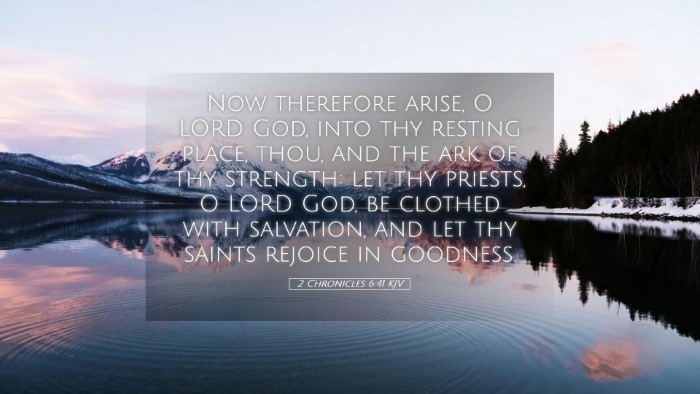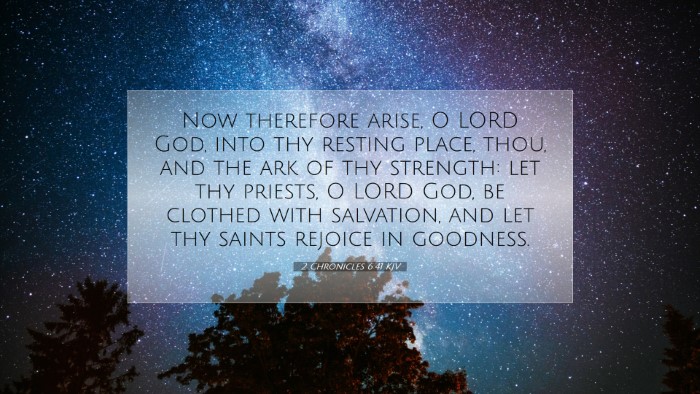Commentary on 2 Chronicles 6:41
Verse Context and Text:
2 Chronicles 6:41 states: "Now therefore arise, O LORD God, into thy resting place, thou, and the ark of thy strength: let thy priests, O LORD God, be clothed with salvation, and let thy saints rejoice in goodness."
Introduction
This verse is part of King Solomon’s dedicatory prayer regarding the temple built in Jerusalem, which was intended as a dwelling place for the Lord. This commentary draws insights from renowned public domain scholars such as Matthew Henry, Albert Barnes, and Adam Clarke, offering a collective interpretation that elucidates its significance for pastors, students, theologians, and Bible scholars.
1. Exegesis of 2 Chronicles 6:41
This passage prompts a profound invocation as Solomon calls on God to “arise” into His resting place, coupled with the acknowledgment of the ark as the representation of God’s covenant and strength.
Divine Presence and Resting Place
According to Matthew Henry, the "resting place" symbolizes both God's immanence and transcendence. While God is omnipresent, His resting place among His people in the temple represents a special covenant relationship, emphasizing His glory and grace bestowed upon Israel. The temple becomes not only a physical structure but a spiritual sanctuary where divine and human meet.
The Ark of Strength
The “ark of thy strength” refers to the Ark of the Covenant, which encompasses the Ten Commandments, manna, and Aaron’s rod. Albert Barnes notes that the ark is a symbol of God's presence and power, reminding the congregation of their responsibility to uphold the covenant under God's guidance and power.
2. Liturgical and Theological Implications
The prayerful invocation by Solomon has notable liturgical and theological implications, as emphasized by the commentators.
Clothing of Priests
Solomon expresses a desire for the priests to be “clothed with salvation”. Adam Clarke interprets this as an appeal for divine assistance and purity for the priestly class, integral in their mediatory work. This highlights the deeper theological truth that, without God’s imputed righteousness, all efforts in worship and mediation are empty.
Rejoicing in Goodness
The phrase “let thy saints rejoice in goodness” opens a dimension of worship intrinsic to the worshiper’s response to God’s benevolence. Matthew Henry posits that there is an intimate relationship between the recognition of God’s blessings and the joy that follows. True rejoicing stems from the acknowledgment of God’s faithfulness and providential goodness towards His people.
3. The Role of the Temple in Israel’s National Identity
The temple stands as a monument of God’s covenant with Israel. This verse reflects the corporate nature of communal worship and identity.
Significance of the Temple
As noted by Albert Barnes, the temple was central to Jewish worship, serving as the focal point of national and spiritual identity. It embodied both God’s promise to dwell among His people and the nation's calling to reflect His holiness. It is within the context of the temple that Solomon's prayer finds resonance, reminding the authors that the church today carries a similar responsibility under the New Covenant.
4. Application for Modern Believers
As modern believers reflect upon this verse, some key applications arise.
- Awareness of God’s Presence: Just as Solomon invoked God to arise into the temple, believers today should seek to recognize God’s presence in their lives and communities.
- Holiness in Ministry: The call for priests to be clothed with salvation is a reminder that every minister of the Gospel must depend on God’s grace.
- Joy in Salvation: The emphasis on rejoicing in goodness calls believers to celebrate the blessings and salvation provided through Christ, cultivating a spirit of gratitude.
Conclusion
2 Chronicles 6:41 serves as a poignant reminder of the sacred covenant between God and His people. Through the insights of historically respected commentators, this verse invites pastors, scholars, and all believers to pursue a deeper understanding of God’s presence and to engage in worship that is marked by humility, joy, and a definitive reliance on His salvation.


